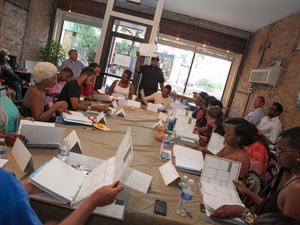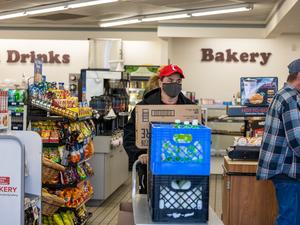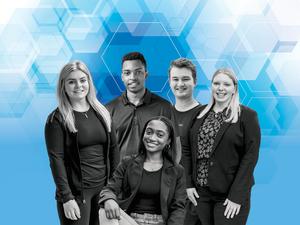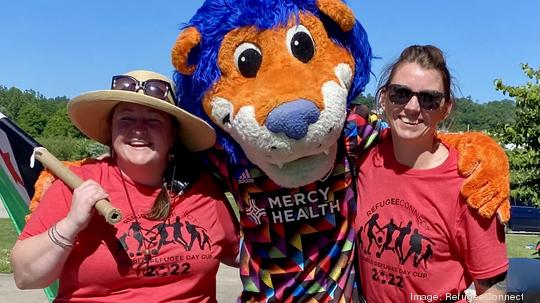
RefugeeConnect is still in its infancy compared to some of the region’s other nonprofits and social impact companies, but it’s fulfilling a big mission all the same.
Formally, the group works to connect refugees — people forced to flee their country to escape persecution or war — with resources to rebuild their lives as U.S. citizens.
Fueled by recent funding from philanthropy groups Social Venture Partners and bi3, it’s looking to build out and grow one of its newest programs — one that aims to help refugees navigate the complex U.S. health system.
Study: Refugees lack coordinated education, employment, housing, health care
RefugeeConnect’s history dates back to 2013, founded by the Junior League of Cincinnati after a routine community needs assessment. It determined that connecting refugees to existing resources was a pressing need in Greater Cincinnati and Northern Kentucky.
The organization became an independent nonprofit in 2018.
Kristin Burgoyne, RefugeeConnect’s executive director, leads the small team of five. She said the organization has grown greatly in terms of outreach and programing, especially during the pandemic.
Expanding the health navigator program, its newest offering, is particularly exciting.
“We’ve seen — and continue to see — a lot of families with extensive medical needs who are under resourced, who don't know how to access services, who are not taking advantage of benefits because they don't know about those benefits,” she said. “We wanted to have staff in place who could address that specific need.”
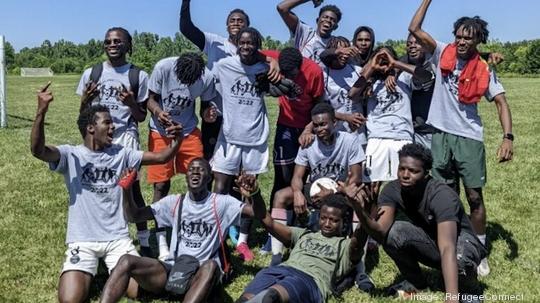
While RefugeeConnect offers a community engagement programs, educational outreach, a World Refugee Day Cup, an annual soccer tournament, as well as a scholarship fund, the navigator model “is really the vision for our organization going forward,” Burgoyne said.
Refugees and asylees need help navigating unfamiliar systems, new cultural norms and language barriers.
RefugeeConnect offers a more generalized community navigator program. RefugeeConnect trains cultural leaders, refugees and immigrants themselves who've lived here for a number of years and likely had to navigate social systems on their own. Their job is to connect families to resources, services, programs and benefits — using the family’s native language (collectively, RefugeeConnect staff speak roughly 15 languages).
Its second bucket is offering more specialized navigators, “experts in a specific system,” Burgoyne said. There’s a college and career readiness navigator, for instance, and a domestic violence navigator.
The health navigator program, specifically, was born out of a research pilot held in partnership with Cincinnati Children's Hospital in 2019. A health navigator worked specifically with Nepali-speaking Bhutanese families who had children with extensive medical needs.
Research from the pilot helped inform the program’s next iteration. The pandemic provided for even more information.
“Between the research study and then Covid-19, we really found the model works,” said Megan Iverson, program director for RefugeeConnect. “We are empowering community leaders who become (part of) our staff, we’re training and supporting them to go out and support more community members. The ripple effect is really something to see.”
Local groups providing funding, mentoring, support
The health navigator concept is the one RefugeeConnect opted to pitch to Social Venture Partners Cincinnati, a group comprised of local philanthropists, during SVP’s inaugural Project XLR8 program, a new accelerator launched in 2021. RefugeeConnect was the winning team following the eight-month program.
Its health navigator program also caught the eye of — and recently received $300,000 in funding from — bi3, a Bethesda Inc.-backed grant-making initiative.
With the Social Venture partnership in particular, teams from SVP will work with RefugeeConnect to help identify and solve the most pressing challenges in launching the health navigator program
In terms of funding, Project XLR8 includes a $60,000 investment over three years. Three other nonprofits were finalists for the award, which Social Venture Partners announced earlier this year.
Christopher Chen, a partner with Social Venture Partners and a Google employee, said RefugeeConnect’s mission resonated most with SVP's partnership. In 15 years, SVP has contributed $2.5 million to Greater Cincinnati nonprofits and offered more than 50,000 free counseling hours.
The health navigator will ultimately provide health care resources, support and coordinated services to refugee families. The program is expected to increase health insurance enrollment, the use of health services and the number of refugees receiving preventive vaccinations, as well as enable greater understanding of mental health resources, SVP said.
“This is a high-impact concept we believed is very relevant for the times — given what's been going on in Afghanistan and, of course, now in Ukraine,” Chen said. “The dollars we have (to give) are relatively small —and I say that humbly — but it’s the network we bring that's going to be very beneficial. They have this innovative concept we can help them hone and develop a clear business plan around.”
Using both pockets of funding, RefugeeConnect will hire and train at least one health full-time navigator, one part-time navigator and cover other miscellaneous costs. It hired that first health navigator in September.
Burgoyne said the plan is to add to that navigator team year-over-year.
“We wanted to start small, do our due diligence and make sure what we're offering to the community makes sense,” she said. “We envision this program growing over time.”
